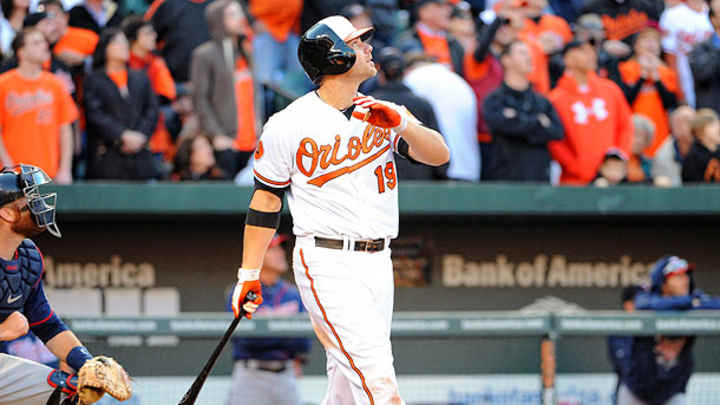Examining Chris Davis' historic start for the Orioles

Chris Davis' surge to start the season has put him in some elite baseball company. (Mark Goldman/Icon SMI)

Chris Davis hit a grand slam off Twins lefty Tyler Robertson in the eighth inning of Friday's 9-5 Orioles win in Baltimore. The home run was Davis' fourth in as many games this year and the runs he drove in inflated his RBI total to 16, both records for the first four games of the season.
Davis' streak of home runs in the first four games of the season matches the mark set by Willie Mays in 1971 and since tied by Mark McGwire in 1998 and Davis' then-teammate Nelson Cruz in 2011, while Davis holds the RBI record outright. He has now homered and driven in at least three runs in four straight games. The only players ever to do that in five straight games at any point in a season were Lou Gehrig in 1931 and Bill Dickey in 1937.
Davis' hot start also put him in position to challenge the all-time home run and RBI records for the month of April. Albert Pujols set the April homer mark at 14 in 2006, a record tied by Alex Rodriguez the following year. Davis needs ten more in the Orioles’ remaining 23 games this month to join those two all-time greats. Juan Gonzalez and Mark McGwire set the April RBI mark simultaneously in 1998, both driving in 36. Davis needs 20 more in 23 games to match that mark.
McGwire and Gonzalez drove in 147 and 157 runs, respectively, in 1998, which was also the year that McGwire set the single-season home run mark with 70. Pujols and Rodriguez hit 49 and 54 home runs, respectively, in the seasons following their record-setting Aprils, but a hot start is no guarantee of sustained performance.
In 1971, the 40-year-old Mays hit just one more home run in April after his season-opening streak of four in four games and finished the season with just 18 home runs (though he also set a career high with a league-leading 112 walks). In 2011, Cruz hit just three more home runs in April after his streak and finished with 29 due to injuries which cost him large parts of May and September.
As for Davis, this sort of home run streak is nothing new. At the very end of last season, games 156 through 161, Davis homered in six straight contests -- with two dingers in the first of those -- for seven home runs in six games, a streak which gave him ten on the month. Ten homers in the month of September, incidentally, was the warning shot that Jose Bautista fired in 2009 before shocking everyone with his breakout 54-homer season in 2010.
Of course, that's anecdotal evidence. Reaching double-digits in home runs in September is not a clear indication of a big power season to come. Michael Cuddyer also hit ten home runs in September 2009, and he hit just 14 the following year. Karim Garcia hit ten home runs in September 2002 and hit just 21 more over the remainder of his major league career.
I could list more counter examples, but I won't, because Chris Davis doesn't need to prove that he's a power hitter. He hit 33 home runs last year, 38 in 736 plate appearances in his first two seasons with the Texas Rangers, and 36 in his last full minor league season in 2007. That's well-established 30-homer power, the kind that will allow for the sort of hot streak he's on now.
What's remarkable about Davis' start to this season is the fact that he made it back to this point after nearly disappearing from the game. After his first two seasons with the Rangers, Davis' production collapsed in 2010 due to a terrible approach at the plate, and over that season and the next, his age-24 and -25 seasons, he hit a mere .238/.295/.361 with six home runs in 346 plate appearances in the major leagues. However, when sent back down to the minors he put up some absurd numbers, including 24 home runs in 48 games for Triple-A Round Rock in 2011, a performance that included a .368/.405/.824 batting line.
Despite that performance, the Rangers, who had gone to the World Series without Davis in 2010 and had fellow 25-year-old Mitch Moreland at first base, had seen enough of Davis against major league pitching, and flipped him to the Orioles with Tommy Hunter for reliever Koji Uehara. Davis didn't show much more promise in his brief major league stint with the Orioles in late 2011, but with little to lose, the Birds made him their Opening Day first baseman in 2012. A hot start (.304/.350/.542 though June 14), his ability to play the outfield corners and the ever-present threat of a longball sustained him through some mid-season doldrums (.192/.249/.328 in 213 PA from June 14 to August 21) until his monster September locked him into this year's lineup.
Given the plate discipline and pitch-recognition problems that nearly derailed Davis' career, one of the more remarkable aspects of his current hot streak is the fact that he has only struck out once in 18 plate appearances compared to a previous career rate of one strikeout every 3.2 PA, including once every 3.3 PA last year. If you needed any more proof that Davis is locked in, there you go. However, if Davis' 9-for-15 performance and four home runs are all his doing, when it comes to his gaudy RBI total he must share credit with his teammates, particularly Adam Jones, who, batting third or fourth, has scored six of those 16 runs by getting on base ahead of fifth-place hitter Davis at a .526 clip (10-for-19, no walks). Nick Markakis, who has hit third in the last three games, has scored three of those runs, and Davis has scored four himself.
